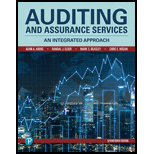
Auditing And Assurance Services
17th Edition
ISBN: 9780134897431
Author: ARENS, Alvin A.
Publisher: PEARSON
expand_more
expand_more
format_list_bulleted
Question
Chapter 6, Problem 21.1MCQ
To determine
Indicate the major reason for an independent auditor to gather audit evidence.
Expert Solution & Answer
Want to see the full answer?
Check out a sample textbook solution
Students have asked these similar questions
I won't to this question answer accounting
Please provide correct answer general Accounting
Do fast answer of this accounting questions
Chapter 6 Solutions
Auditing And Assurance Services
Ch. 6 - Prob. 1RQCh. 6 - Prob. 2RQCh. 6 - Prob. 3RQCh. 6 - Prob. 4RQCh. 6 - Prob. 5RQCh. 6 - Prob. 6RQCh. 6 - Prob. 7RQCh. 6 - What are the six elements of professional...Ch. 6 - What are the five elements of an effective...Ch. 6 - Describe two of the more common judgment traps and...
Ch. 6 - Identify the cycle to which each of the following...Ch. 6 - Why are sales, sales returns and allowances, bad...Ch. 6 - Prob. 13RQCh. 6 - Prob. 14RQCh. 6 - Prob. 15RQCh. 6 - Prob. 16RQCh. 6 - Prob. 17RQCh. 6 - Prob. 18RQCh. 6 - Prob. 19RQCh. 6 - Prob. 20RQCh. 6 - Prob. 21.1MCQCh. 6 - Prob. 21.2MCQCh. 6 - Prob. 21.3MCQCh. 6 - Prob. 22.1MCQCh. 6 - Prob. 22.2MCQCh. 6 - Prob. 22.3MCQCh. 6 - Prob. 23.1MCQCh. 6 - Prob. 23.2MCQCh. 6 - Prob. 23.3MCQCh. 6 - Prob. 24.1MCQCh. 6 - Prob. 24.2MCQCh. 6 - Prob. 24.3MCQCh. 6 - Prob. 25DQPCh. 6 - Prob. 26DQPCh. 6 - Prob. 27DQPCh. 6 - Prob. 28DQPCh. 6 - Prob. 29DQPCh. 6 - Prob. 30DQPCh. 6 - Prob. 31DQPCh. 6 - Prob. 32DQPCh. 6 - Prob. 33DQPCh. 6 - Prob. 34DQP
Knowledge Booster
Similar questions
arrow_back_ios
SEE MORE QUESTIONS
arrow_forward_ios
Recommended textbooks for you
 Auditing: A Risk Based-Approach (MindTap Course L...AccountingISBN:9781337619455Author:Karla M Johnstone, Audrey A. Gramling, Larry E. RittenbergPublisher:Cengage Learning
Auditing: A Risk Based-Approach (MindTap Course L...AccountingISBN:9781337619455Author:Karla M Johnstone, Audrey A. Gramling, Larry E. RittenbergPublisher:Cengage Learning Auditing: A Risk Based-Approach to Conducting a Q...AccountingISBN:9781305080577Author:Karla M Johnstone, Audrey A. Gramling, Larry E. RittenbergPublisher:South-Western College Pub
Auditing: A Risk Based-Approach to Conducting a Q...AccountingISBN:9781305080577Author:Karla M Johnstone, Audrey A. Gramling, Larry E. RittenbergPublisher:South-Western College Pub- Business/Professional Ethics Directors/Executives...AccountingISBN:9781337485913Author:BROOKSPublisher:Cengage
 Accounting Information SystemsAccountingISBN:9781337619202Author:Hall, James A.Publisher:Cengage Learning,
Accounting Information SystemsAccountingISBN:9781337619202Author:Hall, James A.Publisher:Cengage Learning,

Auditing: A Risk Based-Approach (MindTap Course L...
Accounting
ISBN:9781337619455
Author:Karla M Johnstone, Audrey A. Gramling, Larry E. Rittenberg
Publisher:Cengage Learning

Auditing: A Risk Based-Approach to Conducting a Q...
Accounting
ISBN:9781305080577
Author:Karla M Johnstone, Audrey A. Gramling, Larry E. Rittenberg
Publisher:South-Western College Pub


Business/Professional Ethics Directors/Executives...
Accounting
ISBN:9781337485913
Author:BROOKS
Publisher:Cengage

Accounting Information Systems
Accounting
ISBN:9781337619202
Author:Hall, James A.
Publisher:Cengage Learning,